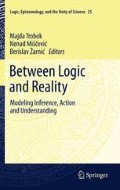Abstract
The paper’s aim is to determine and discuss in which sense, if any, Frege’s and neo-Fregean logicism are responding to the epistemological challenge concerning our arithmetical knowledge. More precisely the paper analyses what the epistemological significance of Frege’s logicist programme amounts to, namely, the objective justificatory connections obtaining between arithmetical and logical statements. It then contrasts this result with the self-understanding of the neo-Fregeans who allegedly follow Frege’s steps, but in fact take a rather different direction.
Access this chapter
Tax calculation will be finalised at checkout
Purchases are for personal use only
Notes
- 1.
- 2.
Wright, On the philosophical significance of Frege’s theorem, p. 210.
- 3.
Wherever possible, the Grundlagen quotations are taken from (Beaney [1]); alternatively they are from Austin’s translation.
- 4.
- 5.
See e.g., Burge [3].
- 6.
The principle has been called Hume’s Principle by Boolos (in “The consistency of Frege’s Foundations of Arithmetic”, in [2]). Boolos gave it this title because it recalls a remark in Hume’s Treatise (Book I, Part iii, Section 1, par. 5), and because Frege quotes Hume in Grundlagen (§63):
when two numbers are so combin’d, as that the one always as unite answering to every unite of the other, we pronounce them equal …
- 7.
See e.g., Hale [7].
- 8.
Hale and Wright [10, p. 169].
- 9.
Ebert and Shapiro [5, p. 421].
References
Beaney, Michael. 1997. The Frege Reader. Oxford: Blackwell Publishing.
Boolos, George. 1998. Logic, Logic and Logic. Cambridge, MA: Harvard University Press.
Burge, Tyler. 2005. Truth, Thought, Reason—Essays on Frege. Oxford: Clarendon Press.
Dummett, Michael. 1991. Frege : Philosophy of Mathematics. Cambridge, MA: Harvard University Press.
Ebert, Philip, and Stewart Shapiro. 2009. “The Good, the Bad and the Ugly.” Synthese 170:415–41.
Frege, Gottlob. 1884. Die Grundlagen der Arithmetik. Translated by Austin, J.L., 1953, The Foundations of Arithmetic. New York, NY: Harper & Brothers.
Hale, Bob. 1999. “Intuition and Reflection in Arithmetic II.” Proceedings of the Aristotelian Society 73:75–98.
Hale, Bob, and Crispin Wright. 2001. The Reason’s Proper Study—Essays Towards a Neo-Fregean Philosophy of Mathematics. Oxford: Clarendon Press.
Hale, Bob, and Crispin Wright. 2002. “Benacerraf’s Dilemma Revisited.” European Journal of Philosophy 10:101–29.
Hale, Bob, and Crispin Wright. 2005. “Logicism in the Twenty-First Century.” In The Oxford Handbook of Philosophy of Mathematics and Logic, edited by Stewart Shapiro, 172–73, Oxford University Press, New York.
Kitcher, Philip. 1979. “Frege’s Epistemology.” The Philosophical Review 88:235–62.
Lakatos, Imre. 1976. Proofs and Refutations. Cambridge: Cambridge Universtity Press.
Martin-Löf, Per. 1996. “On the Meaning of the Logical Constants and the Justifications of the Logical Laws.” Nordic Journal of Philosophical Logic 1:11–60.
Shapiro, Stewart. 2000. “Introduction to the Abstraction and Neo-Logicism Special Issue.” Philosophia Mathematica 8(II):99.
Shapiro, Stewart. 2004. “Foundations of Mathematics: Metaphysics, Epistemology, Structure.” The Philosophical Quarterly 54:22–23.
Shapiro, Stewart. 2009. “The Measure of Scottish Neo-Logicism.” In Logicism, Intuitionism, and Formalism, edited by Linström et al., Synthese Library 341. Springer Dordrecht; London.
Wright, Crispin. 1983. Frege’s Conception of Numbers as Objects. Aberdeen: Aberdeen University Press.
Acknowledgements
Acknowledgments Portions of this were presented at the conference in Dubrovnik in May 2010. Many thanks to the participants for their comments: Stewart Shapiro, Per Martin-Löf, Alan Wier, Berislav Žarnić, Stephen Reed. Many thanks as well to Nenad Smokrović and especially to Nenad Miščević.
Author information
Authors and Affiliations
Corresponding author
Editor information
Editors and Affiliations
Rights and permissions
Copyright information
© 2012 Springer Science+Business Media B.V.
About this chapter
Cite this chapter
Trobok, M. (2012). Debating (Neo)logicism: Frege and the Neo-Fregeans. In: Trobok, M., Miščević, N., Žarnić, B. (eds) Between Logic and Reality. Logic, Epistemology, and the Unity of Science, vol 25. Springer, Dordrecht. https://doi.org/10.1007/978-94-007-2390-0_5
Download citation
DOI: https://doi.org/10.1007/978-94-007-2390-0_5
Published:
Publisher Name: Springer, Dordrecht
Print ISBN: 978-94-007-2389-4
Online ISBN: 978-94-007-2390-0
eBook Packages: Humanities, Social Sciences and LawPhilosophy and Religion (R0)

